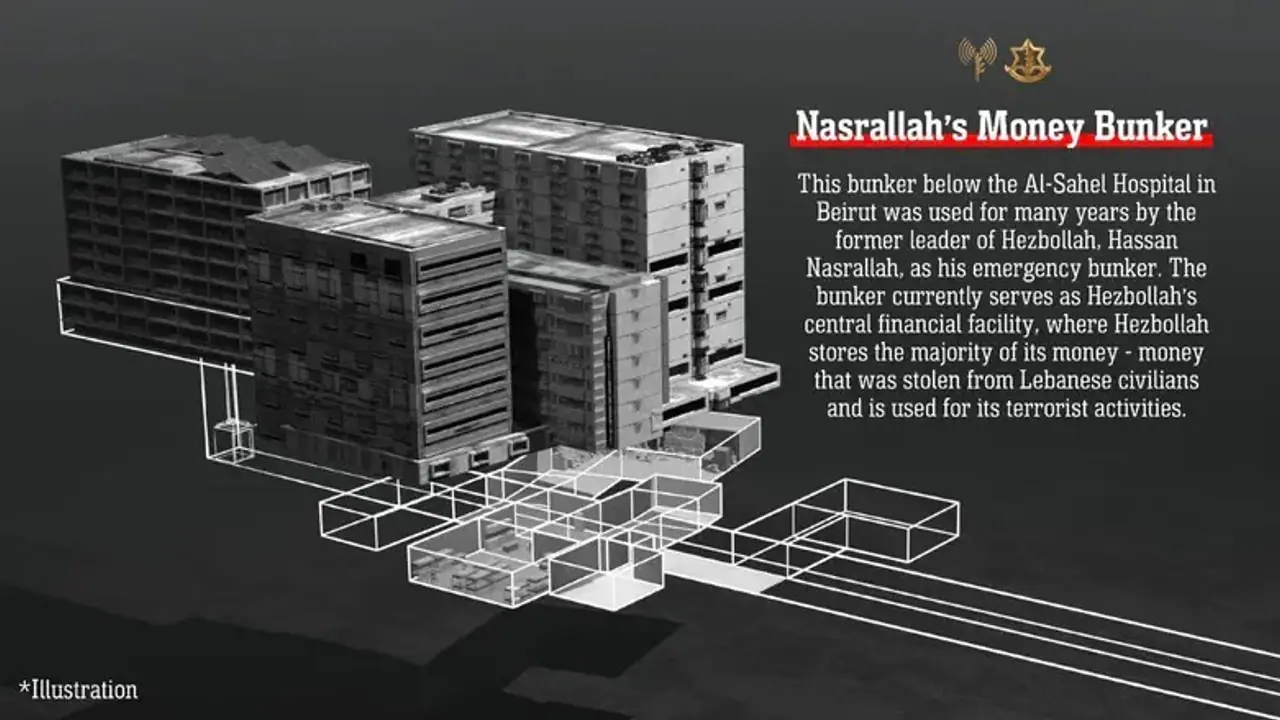In a stunning revelation, the Israeli military claims it has uncovered an astonishing cache of wealth—hundreds of millions of dollars in cash and gold—hidden beneath a hospital in the heart of Beirut.
In a stunning revelation, the Israeli military claims it has uncovered an astonishing cache of wealth—hundreds of millions of dollars in cash and gold—hidden beneath a hospital in the heart of Beirut. The bunker, allegedly constructed by Hezbollah, was found underneath the Al-Sahel Hospital, a medical facility that Israel says masked the militant group’s vast financial resources.

In a bold televised address, Rear Admiral Daniel Hagari, Israel's chief military spokesperson, disclosed that this secret underground bunker was established by Hezbollah's former leader, Sayyed Hassan Nasrallah, who was reportedly killed by Israel last month. Hagari detailed how the bunker was not only built to last for extended periods but was also brimming with immense financial assets.
“There are hundreds of millions of dollars in cash and gold inside the bunker right now,” Hagari stated, his words a stark warning to the Lebanese government and international organizations. “Don’t allow Hezbollah to use the money for terror and to attack Israel.”
Despite the alarming discovery, Hagari was quick to assure that Israel had no intention of targeting the hospital itself, opting instead to focus its airstrikes on Hezbollah’s financial assets elsewhere. He emphasized that these claims were the result of meticulous intelligence gathering over several years, painting a picture of a long-running investigation finally coming to light.
However, Fadi Alameh, a Lebanese lawmaker affiliated with the Shi'ite Amal Movement and director of Al-Sahel Hospital, fiercely rejected Israel’s allegations. He condemned them as “false and slanderous,” insisting that the hospital housed only operating rooms, patients, and a morgue.
In an interview with Reuters, Alameh urged the Lebanese Army to inspect the hospital, confident that nothing beyond legitimate medical services would be found. Though the hospital was in the process of evacuating, Alameh did not suggest any immediate threat of an Israeli strike, instead expressing concern over the dangerous implications of Israel’s accusations.
Israel's operation against Hezbollah
Meanwhile, Israel’s military campaign against Hezbollah showed no signs of slowing down. Israeli Chief of General Staff, Herzi Halevi, confirmed to soldiers that Israeli aircraft had conducted strikes on approximately 30 locations linked to Al-Qard al-Hassan, an entity Israel has identified as Hezbollah’s financial powerhouse, between Sunday and Monday. Hagari further hinted at more targeted strikes on Hezbollah’s financial infrastructure in the coming days, signaling Israel’s intent to cripple the group’s economic backbone.
Hezbollah and Israel have been locked in a relentless cycle of fire since October last year, when Hezbollah declared its support for the Palestinians following the outbreak of war in Gaza. What began as symbolic solidarity has escalated into a tense, almost routine, exchange of fire across the Lebanese-Israeli border, leaving the region on edge.
In late September, Israel announced a “new phase” in its operations, escalating its attacks on Hezbollah to secure northern Israel from militant strikes. As tensions continue to boil over, the region is bracing for the potential of further conflict, with Hezbollah’s financial network firmly in Israel’s crosshairs.
